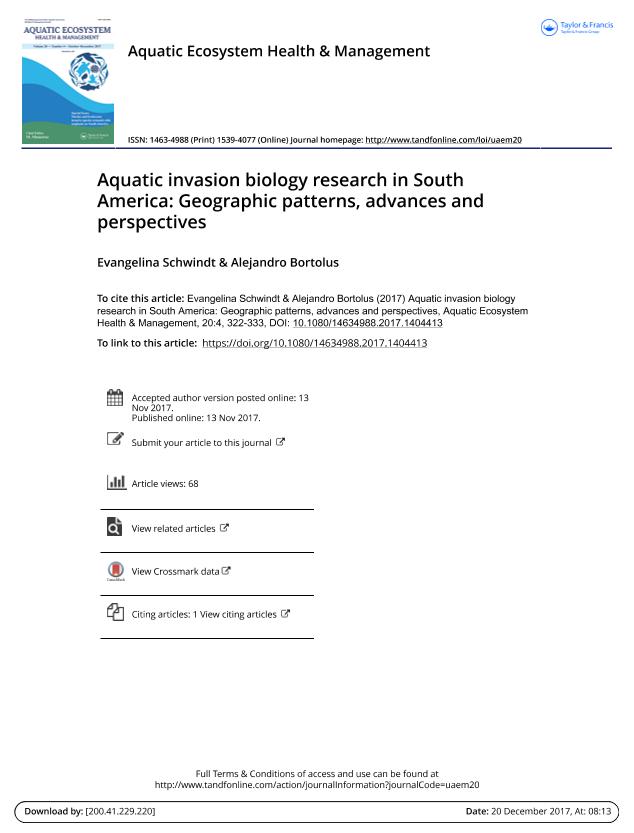Artículo
Aquatic invasion biology research in South America: Geographic patterns, advances and perspectives
Fecha de publicación:
10/2017
Editorial:
Taylor & Francis
Revista:
Aquatic Ecosystem Health And Management
ISSN:
1463-4988
Idioma:
Inglés
Tipo de recurso:
Artículo publicado
Clasificación temática:
Resumen
In this work, we describe and discuss the current status, trends, and gaps for aquatic invasion research in South America, and we reveal the current state of multinational collaborations on these matters across the continent. First, to measure temporal change in the magnitude of invasion research for South America, we replicated a survey performed in 2001 for marine exotic species, using identical methods used back then to search publications in the Aquatic Science and Fisheries Abstracts database. Second, to compare the South America invasion research effort, in terms of the production of scientific literature on aquatic invasion biology, across time (years), countries, aquatic (freshwater, estuarine, and marine) environments, themes, and taxonomic groups, we performed a more comprehensive search of publications using multiple databases (Scielo, ASFA, Scopus and Google Scholar). This exhaustive survey included articles in international, regional and local peer reviewed journals on aquatic (freshwater, marine and estuarine) exotic species of SA that were published between 2004 and 2014 in the three dominant languages of South America. We found that the research effort for marine exotic species research in South America increased 9-fold between the two time periods (1997–2001 vs. 2002–2014), with most (90%) of recent research occurring in the Atlantic (vs. Pacific) coast. This disparity in research effort between coasts is consistently evident for individual environments (including freshwater, estuarine, and marine waters) and countries. While the focus of publications is unevenly distributed among research themes and taxa, the paucity of comparative analyses among countries is especially striking. Despite the general increment in research effort within the discipline, we consider there is an urgent need for more solid and concerted multinational efforts to address (financially, scientifically and socially) the conspicuous gaps in aquatic invasion research. Failing to make these efforts is probably the major threat hampering the development of successful long term programs and strategies directed to prevent, manage and/or control the introduction of exotic species and their many impacts in the continent.
Archivos asociados
Licencia
Identificadores
Colecciones
Articulos(IBIOMAR)
Articulos de INSTITUTO DE BIOLOGIA DE ORGANISMOS MARINOS
Articulos de INSTITUTO DE BIOLOGIA DE ORGANISMOS MARINOS
Citación
Schwindt, Evangelina; Bortolus, Alejandro; Aquatic invasion biology research in South America: Geographic patterns, advances and perspectives; Taylor & Francis; Aquatic Ecosystem Health And Management; 20; 4; 10-2017; 322-333
Compartir
Altmétricas




